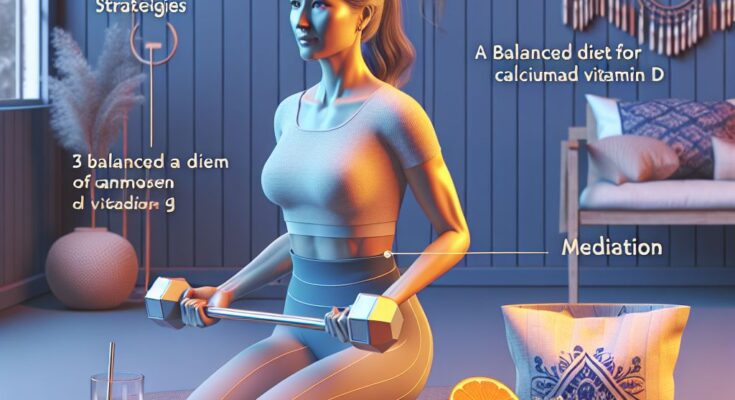Discover essential tips for maintaining bone strength post-menopause with our holistic health strategies. This guide explores the importance of nutrition, exercise, and lifestyle changes to support bone density and overall well-being. Learn how to incorporate nutrient-rich foods, effective workouts, and stress management techniques to keep your bones strong and healthy. Embrace a comprehensive approach to bone health and thrive in your post-menopausal years.
Key Takeaways
- Understanding the importance of bone health after menopause is crucial for preventing conditions like osteoporosis.
- Incorporating specific nutrients such as calcium and vitamin D into your diet can significantly boost bone density.
- Strength training and weight-bearing exercises are essential for maintaining and building bone strength post-menopause.
- Supplements can be a helpful addition to your diet, but it’s important to choose the right ones and use them wisely.
- Simple lifestyle changes, including better sleep and stress management, can have a positive impact on bone health.
Fortifying Your Frame: Navigating Post-Menopausal Bone Health
When you reach menopause and post-menopause, your body undergoes significant changes that can affect your bones. But the good news is, you have the power to make a difference. With the right approach, you can keep your bones strong and healthy. Here’s how.
Why Bone Health Matters More After Menopause
After menopause, the decline in estrogen levels can lead to a decrease in bone density, making bones more fragile and increasing the risk of fractures. It’s a big deal because bones are the support system of our bodies. Think of them as the framework that keeps everything in place. When that framework weakens, it affects your overall mobility and independence.
Therefore, it’s vital to take proactive steps to ensure your bones stay as strong as possible. This includes understanding how your diet, exercise routine, and lifestyle can either support or hinder your bone health.
Identifying the Signs of Weakening Bones
Often, there aren’t any obvious signs until a bone breaks. However, some subtle clues may indicate weakening bones, such as receding gums, weakened grip strength, or brittle nails. If you’re noticing any of these changes, it’s time to focus on your bone health.
Diet: The Foundation of Bone Strength
What you eat plays a starring role in maintaining bone strength. Your bones need a variety of nutrients to stay healthy, and your diet is the best source for these.
Top Nutrients to Boost Bone Density
To keep your bones strong, focus on these key nutrients:
- Calcium: It’s the building block of bone health. Dairy products, leafy greens, and almonds are great sources.
- Vitamin D: Without it, your body can’t absorb calcium. Sunlight is the best natural source, but you can also find it in fatty fish and fortified foods.
- Magnesium: It plays a crucial role in converting vitamin D into its active form and in bone formation. Nuts, seeds, and whole grains are rich in magnesium.
- Protein: It’s essential for bone repair and strength. Include lean meats, beans, and tofu in your diet.
These nutrients work together to keep your bones strong. For example, without enough vitamin D, your body can’t absorb the calcium from that cheese or those leafy greens. So, balance is key. Discover more about holistic health strategies for post-menopause to maintain strong bones and overall well-being.
Everyday Meals with Bone-Building Superpowers
Let’s put those nutrients into action with some meal ideas:
- Breakfast: Greek yogurt with almonds and a drizzle of honey. The yogurt provides calcium and protein, while the almonds add a magnesium boost.
- Lunch: A hearty salad with leafy greens, salmon, and a sprinkle of sunflower seeds. This meal is a triple threat with calcium, vitamin D, and magnesium.
- Dinner: Grilled chicken with quinoa and steamed broccoli. Chicken brings protein to the table, quinoa contributes more magnesium, and broccoli is another calcium champion.
By incorporating a variety of these foods into your daily meals, you’re setting the stage for stronger bones. And remember, hydration is also important, so drink plenty of water throughout the day.
Balance and Flexibility: Low-Impact Workouts for Maximum Benefit
Balance and flexibility exercises are just as important as strength training when it comes to bone health. Activities like yoga, Pilates, and tai chi not only improve your balance, reducing the risk of falls, but also promote flexibility, which keeps your joints healthy. These low-impact workouts can be especially beneficial for maintaining bone strength without putting too much strain on your body.
For example, a yoga pose such as the Warrior II requires you to engage your legs and hips, which helps to strengthen the bones in those areas. Similarly, a tai chi routine involves slow, deliberate movements that enhance balance and can help prevent falls. Incorporating these exercises into your weekly routine, aiming for at least two sessions a week, can make a significant difference in your post-menopause bone health.
Supplements: Filling the Gaps in Bone Nutrition
Even with a well-rounded diet, it can be challenging to get all the nutrients you need for optimal bone health. That’s where supplements come in. They can help fill the gaps, ensuring you’re getting enough of the essential vitamins and minerals your bones crave.
But before you start popping pills, it’s important to talk to a healthcare professional. They can help you determine the right dosage and ensure that the supplements won’t interact with any medications you’re taking.
When choosing supplements, look for quality. Not all supplements are created equal, and some may have better absorption rates than others. It’s worth investing in a reputable brand that’s transparent about its ingredients and manufacturing processes.
Remember, supplements are just that—a supplement to your diet. They shouldn’t be the primary source of your nutrients but rather a backup to a nutrient-rich diet.
- Calcium supplements can help you reach the recommended daily intake, especially if you’re lactose intolerant or don’t consume many dairy products.
- Vitamin D supplements are particularly important if you live in a place with limited sunlight or if you spend most of your time indoors.
- Magnesium and vitamin K2 are also important for bone health and can be taken in supplement form if you’re not getting enough from your diet.
The Need-to-Know on Calcium and Vitamin D
Calcium and vitamin D are the superstars of bone health. Calcium is the main component of bones, while vitamin D is essential for calcium absorption. Adults over the age of 50 should aim for 1,200 milligrams of calcium per day, and between 800 to 1,000 IU of vitamin D.
It’s important to spread your calcium intake throughout the day, as your body can’t absorb more than about 500 milligrams at once. And don’t forget that vitamin D is key because it allows your body to actually use the calcium you’re taking in.
Additional Supplements for Bone Health: What Works?
Besides calcium and vitamin D, other supplements can also support bone health. For instance, vitamin K2 helps direct calcium to your bones instead of your arteries, and magnesium is crucial for converting vitamin D into its active form in the body.
Here’s a quick rundown of supplements that can support bone health:
- Vitamin K2: Directs calcium to bones and away from arteries.
- Magnesium: Essential for bone formation and activating vitamin D.
- Boron: Supports the functions of calcium, magnesium, and vitamin D.
- Omega-3 fatty acids: May help reduce bone loss during the post-menopausal years.
Lifestyle Tweaks to Protect Your Bone Health
Small changes in your daily routine can have a big impact on your bones. Here are a few simple lifestyle tweaks:
- Quit smoking, as it can accelerate bone loss.
- Limit alcohol intake, as excessive consumption can interfere with your body’s ability to absorb calcium.
- Make sure you’re getting enough sleep, as poor sleep can affect bone density.
- Manage your stress levels, since chronic stress can lead to bone loss.
Besides that, maintaining a healthy weight is important. Being underweight can increase the risk of bone loss and fractures, while carrying extra weight can put additional stress on your bones. Striking a balance is key for your bone health.
And let’s not forget about the power of the sun. Just 10-15 minutes of sun exposure a few times a week can help your body produce the vitamin D it needs. Just remember to apply sunscreen after a few minutes to protect your skin.
Hydration is another simple yet often overlooked aspect of bone health. Water is essential for all bodily functions, including maintaining healthy bones. Aim to drink at least eight glasses of water a day, and more if you’re active or live in a hot climate.
Sleep’s Role in Maintaining Strong Bones
A good night’s sleep isn’t just about feeling rested—it’s also about giving your body the time it needs to repair and regenerate, including your bones. During sleep, your body balances hormones that help rebuild bone tissue. Aim for 7-9 hours of quality sleep each night to support your bone health.
Managing Stress to Support Bone Density
Chronic stress can wreak havoc on your body, including your bones. When you’re stressed, your body produces cortisol, which can lead to bone breakdown over time. Finding healthy ways to manage stress, such as through meditation, deep breathing exercises, or spending time in nature, can help protect your bones.
For instance, taking a daily walk not only helps with stress relief but also benefits your bones, as walking is a weight-bearing exercise. So, you’re getting a two-for-one deal: reducing stress and strengthening your bones at the same time.
Remember, taking care of your bones post-menopause is not just about adding things to your life; it’s also about knowing what to limit or avoid. Cut back on caffeine and salt, which can both leach calcium from your bones if consumed in excess.
In conclusion, you have the power to maintain and improve your bone health after menopause. By focusing on your diet, exercise, and lifestyle, you can build a strong foundation that will support you for years to come. It’s never too late to start, so take that first step today and embrace the journey to a stronger you.
Managing Stress to Support Bone Density
Chronic stress can wreak havoc on your body, including your bones. When you’re stressed, your body produces cortisol, which can lead to bone breakdown over time. Finding healthy ways to manage stress, such as through meditation, deep breathing exercises, or spending time in nature, can help protect your bones.
For instance, taking a daily walk not only helps with stress relief but also benefits your bones, as walking is a weight-bearing exercise. So, you’re getting a two-for-one deal: reducing stress and strengthening your bones at the same time.
FAQ
Now that we’ve explored the holistic strategies for bolstering bone health post-menopause, let’s address some common questions you might have.
What lifestyle changes can I make today to improve bone strength?
To improve bone strength today, consider these actionable steps: For more detailed guidance, explore ways to stop bone loss during menopause.
- Increase your intake of calcium and vitamin D through diet or supplements.
- Start a strength training and weight-bearing exercise routine.
- Implement balance and flexibility exercises into your weekly schedule.
- Quit smoking and limit alcohol consumption.
- Ensure you’re getting enough sleep and managing stress effectively.
How does hormone replacement therapy affect post-menopause bone health?
Hormone replacement therapy (HRT) can help maintain bone density by compensating for the estrogen loss experienced during menopause. Estrogen plays a critical role in bone turnover and density, so HRT can be effective in preventing osteoporosis. However, it’s not suitable for everyone and comes with potential risks. It’s essential to discuss this option with your healthcare provider to determine if it’s right for you.
Can certain foods harm my bone density?
Yes, some foods can have a negative impact on bone health. These include:
- Excessive salt, which can cause your body to lose calcium.
- High-caffeine beverages, as caffeine can interfere with calcium absorption.
- Soft drinks, especially those containing phosphoric acid, which may contribute to bone loss.
It’s important to consume these foods in moderation and balance them with nutrient-rich choices that support bone health.
Is it ever too late to start caring for my bones?
It’s never too late to start caring for your bones. While it’s best to begin building bone density earlier in life, making healthy lifestyle changes post-menopause can still have a positive impact. Implementing a balanced diet, regular exercise, and proper supplementation can help slow down bone loss and even build bone strength.
What’s the best kind of exercise for strengthening bones post-menopause?
The best exercises for strengthening bones post-menopause are those that are weight-bearing and involve resistance. These include:
- Walking, hiking, or jogging.
- Strength training with weights or resistance bands.
- Low-impact aerobics or dance.
- Tai chi or yoga for balance and flexibility.
Combining these exercises with a balanced diet rich in bone-healthy nutrients will give you the best chance at maintaining strong bones.
In conclusion, you have the power to maintain and improve your bone health after menopause. By focusing on your diet, exercise, and lifestyle, you can build a strong foundation that will support you for years to come. It’s never too late to start, so take that first step today and embrace the journey to a stronger you.



